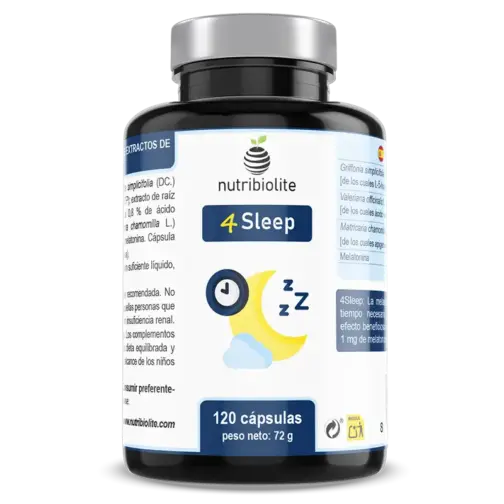Does taking melatonin help you sleep better? A new study published in JMIR Formative Research 2025(study in JMIR formative research 2025) explored this question rigorously: 60 sleep-deprived adults participated in personalised digital trials, testing doses of 0.5 mg and 3 mg melatonin against placebo for 12 weeks, using activity watches and sleep diaries.
The results were clear: melatonin supplementation, even at doses of up to 3mg, did not produce significant improvements in either sleep duration or subjective sleep quality over placebo. The authors note that melatonin is safe and accepted, but its impact is modest when insomnia is not caused by jet lag or biological rhythm mismatches.
What does this mean for your nightly routine? If you sleep little or poorly for no apparent reason, melatonin may not be the easy shortcut you were hoping for, although it is still a physiological option for resetting the internal clock, especially after travel, night shifts or times of stress.
The key is to accompany any external support with habits that support the natural sleep cycle, such as light suppers, dim lighting and digital disconnection before bedtime.
Melatonin, more of a sign than a solution
Melatonin is the hormone that marks the beginning of the night in our body. Its production increases when the light dims and signals the brain that it is time to rest. It is the “signal” that synchronises our biological clock with our environment.
However, as this recent study funded by the US health system (with no commercial conflicts of interest) showed, increasing the dose does not always mean better results. Neither 0.5 mg nor 3 mg substantially changed the quantity or quality of sleep versus placebo. Science suggests that its usefulness is greatest when there is a real circadian rhythm mismatch, such as in jet lag or shift work.
Rest is built on small daily rituals
The study also highlights an indirect but relevant finding: participants who maintained consistent night-time routines (regular schedules, fewer screens and light dinners) reported a slight improvement in their sleep perception, regardless of whether they took melatonin or placebo.
This confirms that everyday gestures set the stage: dimming the lights an hour before bedtime, avoiding stimulants and creating a quiet environment help the body release its own melatonin at the right time.
When external support makes sense
From the age of 40 onwards, natural melatonin levels gradually drop. Chronic stress, menopause, jet lag or shift work can make falling asleep more difficult. This is where a supplement can make physiological sense: not as a magic bullet, but as an accompaniment to the natural process.
The key is to choose formulas that respect the safe doses recommended by European bodies(1 mg is sufficient according to EFSA) and combine other relevant nutrients in the biochemical pathway of sleep.

Melatonin 1 mg and 5-HTP with relaxing plants to facilitate the onset of rest, as a complement to specific nocturnal habits. Responsible use.
How 4Sleep fits into a natural sleep routine
At times when the internal clock loses rhythm, such as with prolonged stress, long journeys or hormonal changes, external support can make sense. 4Sleep, developed by Nutribiolite, follows the physiological logic highlighted by both recent studies and European recommendations. It combines melatonin (1 mg), recognised by scientific evidence as a sleep-inducing adjuvant, with 5-HTP extracted from Griffonia simplicifolia, which enhances the natural synthesis of serotonin and melatonin. Added to this are standardised extracts of valerian and chamomile, plants with a proven relaxing action that do not generate dependence or residual drowsiness. Thus, while melatonin acts as a physiological trigger for sleep onset, the other components provide a synergy that promotes relaxation and the balance of the sleep-wake cycle.
Frequently asked questions about melatonin sleep and 4Sleep
When does it make sense to use a supplement like 4Sleep?
It makes sense when there are factors that disturb your internal rhythm, such as long journeys, sustained stress or hormonal changes. It does not replace a good nightly routine, but it can accompany it when habits are not sufficient.
Why does the formula also include 5-HTP and relaxing plants?
5-HTP is a direct precursor of serotonin and melatonin. Valerian and chamomile help to create a physiological environment conducive to rest without creating dependence or drowsiness upon awakening.
Can I notice immediate effects after taking it?
Some people notice a slight improvement from the first few times they take it. The benefit is usually gradual as you maintain a consistent nightly routine for several nights in a row.
Are there any risks if I take more than the recommended dose?
It is not recommended to take more than 1 mg of melatonin per day unless professionally prescribed. Higher doses do not provide any further benefit and may cause mild discomfort such as headache or daytime sleepiness.
What habits enhance the effect of melatonin?
Eating an early, light dinner, reducing blue light at the end of the day and maintaining a stable schedule help the melatonin signal to be interpreted correctly by the body.
This content is informative and does not replace the advice of a healthcare professional.
















